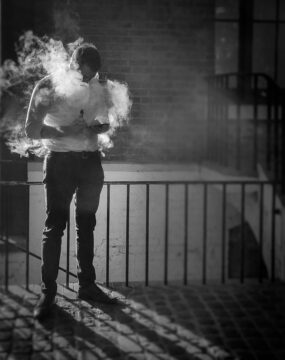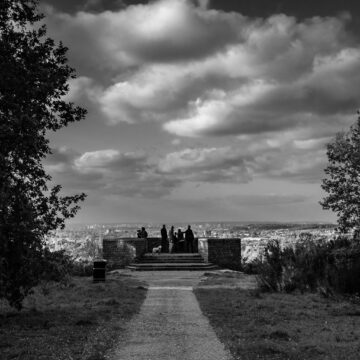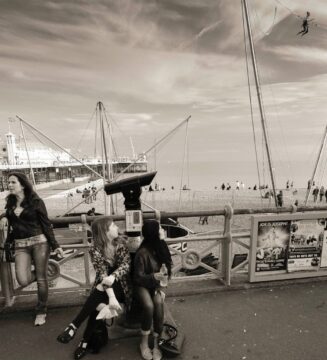by Chris Horner
Negative Capability, that is, when a man is capable of being in uncertainties, mysteries, doubts, without any irritable reaching after fact and reason… —Keats.
To become mature is to have regained the seriousness one had as a child at play. —Nietzsche

Why do we want to know ourselves? Self knowledge seems like an obvious thing to want, perhaps because ‘the unexamined life is not worth living’, or because self knowledge will make us into better people. Self knowledge, the desire to understand who we are and what we really want can be valuable if it makes us kinder, less prone to arrogant dismissal of others when we see our faults reflected in theirs. Philosophy, psychoanalysis and literature have a lot to do with the pursuit of self knowledge and the self improvement we suppose will accompany it. They seem self evidently good things to want to achieve.
The Trap

Yet sometimes self knowledge can be the wrong thing to aim at. This is when we are dominated by an itch to achieve a stable sense of who we are, or what we ‘really want’ that will bring an end to all that striving. Our myth of personal betterment has a prize glittering before it of the achieved self, the better person we could be, more authentic. The problem here, I’d suggest, is that this itch for the knowledge of the truth about ourselves is a mixed thing: in many ways a valuable part of what we think of as growth and maturity, but also a kind of trap.
It can be a trap we spring on ourselves when we imagine that the Thing, identity, offers us stasis, the End, or even the continuous climb up the ladder of self improvement. We might also wonder whose criteria are being applied to the notion of ‘maturity’. We might think of it as joining the busy grownups, or with Nietzsche, think of it as the recovery of something a kind of serious playfulness.[1] We can see the problems with this perhaps more readily through the medium of art.
The Lure
There is a passage in Proust about listening to music that seems to echo the problem of ‘getting there’. In Proust’s great novel there is a constant sense that ‘M,’ the narrator, is trying to get a kind of grasp on his own life, on the shimmering surfaces, mysteries and disappointments of love and the self that loves and is loved. For Proust, the melancholy in love itself is that falling in love doesn’t reveal the nature of the Other, but shrouds it in more mystery, an epistemological problem that the jealous lover can never untangle. This desire to get to the truth though is a lure, offering a consummation that is forever deferred. Truth brings a sense of loss or lack.
Art seems to offer an alternative: unlike life, the narrator comments, great art doesn’t begin by offering the best of itself. However, this is on condition that the final ‘best’ is never achieved. The desire to get to The Truth in art or in life has us running towards an ever receding goal. And if we think we have the truth of it, it can seem a paltry thing to exchange for the desire we started with. Later in the book, M describes the pleasure he has in grasping the structure of a musical composition. The music is somehow beyond him first, he ‘hears nothing’ – but then, like a cathedral in a clearing mist, the outlines of the piece become clear. At the end, the piece is known – but a change has occurred: M remarks that there is now, for him, ‘a piece of music less in the world, perhaps, but a truth the more’ [2] The music is replaced by a truth. Why would we want that?
 Learning to Love
Learning to Love
There is another way. For Nietzsche the key thing is a kind of patience and willingness to let what comes, come. This is a longish quotation but as it is one of the greatest things he ever wrote I shall give it in full:
One must Learn to Love. This is our experience in music: we must first learn in general to hear, to hear fully, and to distinguish a theme or a melody, we have to isolate and limit it as a life by itself; then we need to exercise effort and good-will in order to endure it in spite of its strangeness we need patience towards its aspect and expression and indulgence towards what is odd in it: – in the end there comes a moment when we are accustomed to it, when we expect it, when it dawns upon us that we should miss it if it were lacking; and then it goes on to exercise its spell and charm more and more, and does not cease until we have become its humble and enraptured lovers, who want it and want it again, and ask for nothing better from the world. – It is thus with us, however, not only in music: it is precisely thus that we have learned to love everything that we love. We are always finally recompensed for our good-will, our patience, reasonableness and gentleness towards what is unfamiliar, by the unfamiliar slowly throwing off its veil and presenting itself to us as a new, ineffable beauty: – that is its thanks for our hospitality. He also who loves himself must have learned it in this way: there is no other way. Love also has to be learned. [3]
The end of the process is no end at all. Here a model for loving a piece of music merges with the way we come to love ourselves. Note the absence of truth or moral rectitude: cheerfulness and gratitude are the relevant virtues.
Adam Phillips is surely right when he comments on the shared outlook of Freud and William James that
The enemy of pleasure and growth was stuckness, addiction, fixity, stasis. They teach us about the temptations of stultification, of the allure of inertia, of the wish to attack our own development [….] conversion experiences all too often become the desire for a change that will finally put a stop to the need for change; change in the direction of what is, to all intents and purposes, a satisfyingly reassuring paralysis. [4]
Change is inevitable, and somehow both alluring and worrying. So we want to change to be ‘better’ and then we want it to stop. But if the goal is, instead of a ‘real’ self that knows what it wants and then gets stuck with it, a joyful and inspired openness to a future, then we had better give up on the myth of becoming the Authentic Self, throw the map away and be ready to risk the pleasures of wandering.
***

[1] I have written about this before for 3QD, see: Playpower
[2] Marcel Proust, In Search of Lost Time, Kilmartin/Enright translation -Penguin Books, III, P. 378 .
[3] Nietzsche, The Gay Science, para. 334, Tr. by Walter Kauffman, Vintage Books.
[4] Adam Phillips On Wanting to Change, Preface, page xiii. Penguin Books.
All photographs are by the author.
